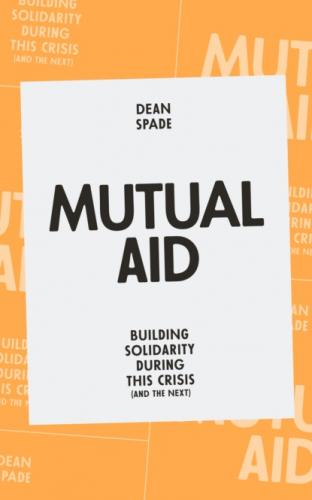Mutual Aid
Mutual Aid
Building Solidarity During
This Crisis (and the Next)
Dean Spade
First published by Verso 2020
© Dean Spade 2020
All rights reserved
The moral rights of the author have been asserted
A teaching guide to accompany this book is available online at
http://v.versobooks.com/Mutual_Aid_Teaching_Guide.pdf
1 3 5 7 9 10 8 6 4 2
Verso
UK: 6 Meard Street, London W1F 0EG
US: 20 Jay Street, Suite 1010, Brooklyn, NY 11201
Verso is the imprint of New Left Books
ISBN-13: 978-1-83976-212-3
ISBN-13: 978-1-83976-213-0 (UK EBK)
ISBN-13: 978-1-83976-214-7 (US EBK)
British Library Cataloguing in Publication Data
A catalogue record for this book is
available from the British Library
Library of Congress Cataloging-in-Publication Data
A catalog record for this book is available
from the Library of Congress
Typeset in Sabon MT by Hewer Text UK Ltd, Edinburgh
Printed and bound by CPI Group (UK) Ltd, Croydon CR0 4YY
Contents
Introduction: Crisis Conditions Require Bold Tactics
1. Three Key Elements of Mutual Aid
Two. Mutual aid projects mobilize people, expand solidarity, and build movements.
3. We Get More When We Demand More
PART II. WORKING TOGETHER ON PURPOSE
4. Some Dangers and Pitfalls of Mutual Aid
Deservingness Hierarchies
Saviorism and Paternalism
Co-optation
Characteristics of Mutual Aid vs. Charity
5. No Masters, No Flakes
Group Culture
Making Decisions Together
Leadership Qualities That Support Mutuality and Collaboration
Handling Money
Burnout
Conflict
Working with Joy
Perfectionism
Mad Mapping
Conclusion: Everything Is at Stake and We’re Fighting to Win
Resource List
Crisis Conditions Require Bold Tactics
The contemporary political moment is defined by emergency. Acute crises, like the COVID-19 pandemic and climate change–induced fires, floods, and storms, as well as the ongoing crises of racist criminalization, brutal immigration enforcement, endemic gender violence, and severe wealth inequality, threaten the survival of people around the globe. Government policies actively produce and exacerbate the harm, inadequately respond to crises, and ensure that certain populations bear the brunt of pollution, poverty, disease, and violence. In the face of this, more and more ordinary people are feeling called to respond in their communities, creating bold and innovative ways to share resources and support vulnerable neighbors. This survival work, when done in conjunction with social movements demanding transformative change, is called mutual aid.
Mutual aid has been a part of all large, powerful social movements, and it has a particularly important role to play right now, as we face unprecedented dangers and opportunities for mobilization. Mutual aid gives people a way to plug into movements based on their immediate concerns, and it produces social spaces where people grow new solidarities. At its best, mutual aid actually produces new ways of living where people get to create systems of care and generosity that address harm and foster well-being.
This book is about mutual aid: it explains why it is so important, what it looks like, and how to do it. It provides a grassroots theory of mutual aid as well as concrete tools for addressing some of the most difficult questions facing mutual aid groups, such as how to work in groups and make decisions together, how to prevent and address conflict, and how to deal with burnout so that we can build a lasting mobilization that can win.
Left social movements have two big jobs right now. First, we need to organize to help people survive the devastating conditions unfolding every day. Second, we need to mobilize hundreds of millions of people for resistance so we can tackle the underlying causes of these crises. In this pivotal moment, movements can strengthen, mobilizing new people to fight back against cops, immigration enforcement, welfare authorities, landlords, budget cuts, polluters, the defense industry, prison profiteers, and right-wing groups. The way to tackle these two big tasks—meeting people’s needs and mobilizing them for resistance—is to create mutual aid projects and get lots of people to participate in them. Social movements that have built power and won major change have all included mutual aid, yet it is often a part of movement work that is less visible and less valued. In this moment, our ability to build mutual aid will determine whether we win the world we long for or dive further into crisis.
We can imagine what is possible when we come together in this way by examining the response of Hong Kong’s protest movement to COVID-19. In 2019, a massive anti-government mobilization swept Hong Kong, with people opposing police and seeking greater control over their lives. By the time the COVID-19 pandemic emerged, Hong Kong’s chief executive, Carrie Lam, had an 80 percent disapproval
